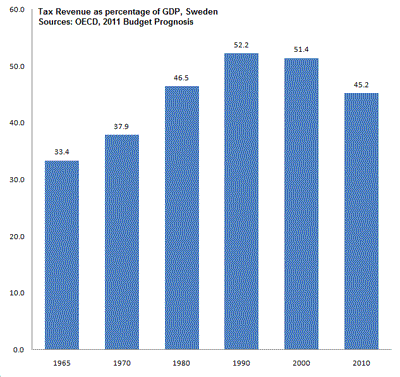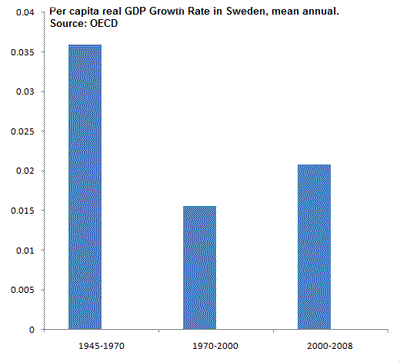The economic success of Sweden has been one of the most powerful arguments of the left. If taxes are bad for the economy, why does the country with the highest tax rates in the world have an widely admired standard of living?
My argument, that Scandinavians due to their culture (work ethics, cooperativeness, trustworthiness, civic-mindedness etc.) are more productive than other westerners, doesn’t work in Sweden. The reason is that Swedes are like fish in the water with regards to their norms and culture. They are generally not aware that they and other Scandinavians are much better behaved than other westerners. Instead the public and the elites naively attribute Sweden’s better functioning society to the Social-Democratic welfare state.
This makes it difficult to argue against the welfare state for true believers. As for foreign liberals, the challenge is even harder, since since outsiders can only remember a few facts about any small society (Sweden=blondes=well organized=affluent=welfare state).
So how did free-marketers ultimately convince the Swedish public to reform the welfare state? The answer lies in the details of modern Swedish economic history, something which Swedes are aware of but outsiders often are not.
You see, Sweden had very high rates of growth when the welfare state was only slightly larger than other developed countries. The period 1870-1970 is sometimes mentioned, when Sweden had the second highest growth rate in the world, below only Japan.
For simplicity, let’s focus on the post-war period. At that time, the Swedish public sector was only slightly bigger than other developed European countries. And for the next two decades, Sweden’s Golden Age, the expansion of the welfare state was no faster than average. Around 1960, Sweden was not an outlier in terms of economic policy. The welfare state only exploded in the late 1960s when the left was ideologically radicalized and the right marginalized.
What happened consequently turned out to be the doom of Social Democracy. The rate of growth slowed. This is not only relative to poor European countries that were catching up after the war, but also countries on the technology frontier such as the United States. Sweden lost ground in terms of living standards, while exports slowed and employment stagnated.
The expansion of the welfare state stopped by 1990, and slowly the country began to reform. There was economic and political chaos because of the (largely coincidental) 1991-1993 economic crisis, which makes it hard to tell a consistent story for those years. However it is undeniable that the Swedish state has been in retreat from 2000 onward, not the least thanks to Fredrik Reinfeldt and Ander Borg.

Coincidentally or not, economic performance is back up.

Sweden is becoming a moderate tax country again. This has made my life much easier when debating taxes and economic performance with leftists who refuse to acknowledge the innate superiority of Swedish workers. Soon, it will be very hard to paint Sweden as a Socialist Utopia. This is not because it is no longer Utopian, but because the country is no longer that socialist (at least in economic policy). This development also means my personal taxes have gone down a lot, although to be honest as a tax-nerd I care much more about the implications for the policy-debate.



Leave a Reply